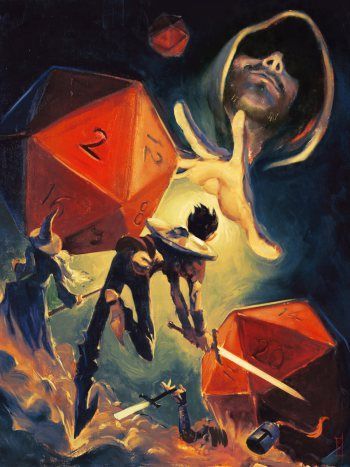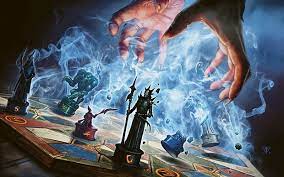Guest Writer: Caleb
Hello, everyone!
The first couple of articles, I discussed the merits of choosing a game based on the skill level of your players, using Dungeons and Dragons 5th Edition and Pathfinder Second Edition as examples. Now, I will talk about what makes a good Game Master (or Dungeon Master, or Storyteller, etc.).

In the next series of articles, I will discuss something practical for all you would-be Game Masters. We will talk about how to run a good game! Do what I tell you in these articles, and your game will go well. With that said, let us discuss our first rule.
Always remember Rule Zero:
Every tabletop RPG system has a Rule Zero. It usually goes like this, The Game Master may change, modify, ignore, or add to the rules as he or she sees fit to ensure the game is fun and runs smoothly.
This means that if you are not sure about what the rules are for a situation, make something up. DO NOT waste time looking up a rule. This is boring, slows down the game, and takes the focus off of what should be an enjoyable time. You gathered with your friends to play a game, not engage in study time!
This means that YOU are in charge of the game and its rules, and you must make sure your players understand and agree with this. Also, any rules you subject to the players must be applied to the enemies too.
Do Critical Failures exist in your world? Okay, great, now everyone in your world can critically fail. This includes the lowliest goblin to a mighty avatar of a god. (…and your players will laugh when a god rolls a 1 on an intimidate check, slips, and yells as he falls down in a heap.)

I know you are asking the question, “When should I use Rule Zero?” The answer is every time a new situation comes up, and you do not know the answer to the situation in the rules. If a player wants to do something interesting, fun, or crazy (or all three), then it is time to use Rule Zero. This can and will happen a lot, especially if you choose to make rulings on the fly (which you should). The more you implement Rule Zero, the more your players will think outside of the box and try new things. This, in turn, will make your games more memorable and more fun. Everyone wins.
Keep in mind that while Rule Zero can and will lead to a smoothly running game, it can and will lead to a problem with a special kind of problem player, The Rules Lawyer. The Rules Lawyer is that player that studies the rules fastidiously, and expects every single word to be followed as written. We will talk about dealing with The Rules Lawyer in another article, Dealing With Problem Players.
Players, I would like to briefly address you on how you can contribute to a game. Do this If your Game Master makes a decision on a rule, and you do not like this ruling. Just accept it quietly, and then discuss it with your Game Master in private. Do not cause a disruption at the table. You are there to play a game and have fun, not pick a fight. Everyone has limited time. Do not waste it in pointless bickering.
That being said, there are some players who will never agree to good implementation of Rule Zero. Do not play with these people. They do not realize it, but tabletop RPGs are not for them. They need board games.
Enjoy your game!

Hi Caleb,
on the other hand, be careful not to invoke Rule Zero too often. Basically our game rules are the ingame laws of nature and any Rule Zero creates (in the best case) a new one or breaks (in the worst case) an existing one, which player and character up to now relied upon. Using the Rule Lawyer as a source of information prevents interruptions for looking up rules but also gives the players a sense of security. At least in my experience creating new rules on the fly every time a player wants to do something new cripples the players’ will to experiment because their characters are only willing to do things where they can reasonably guess the outcome (except in very limited, very desperate situations).
An example from a group I played with: Fighter has hundreds of HP, gets hit by an enemy for hundreds of damage. Basically he just lost 99% of his HP. Next round, he is healed up again and wants to keep on fighting (but maybe a bit more cautious…)
Rule Zero: Fighter gets long lasting disabilities because of massive trauma (basically carried out on a stretcher).
Is that realistic? Probably, loosing 99% of your HP with one hit might have effects
Is there a rule for it? Not to the knowledge of GM or Rule Lawyer.
Is there a rule against it? Not to the knowledge of GM or Rule Lawyer.
Does the rule make sense? Maybe, if the GM wants to remove the Fighter from the battle without killing him.
But the real result is (not focusing on the Player being pissed as well):
Every fighter now has to wonder, what long lasting and not immediately curable effects his next fight can have. Also, why did this suddenly happen to this character? Why did the heal spell not work as intended? Is the cleric to blame? Is it the injured character? Is something in the world amiss? Did something happen to the god of the cleric? Or the god of the fighter?
So while the Rule Zero is a mighty tool for the GM, it is also a dangerous tool and should, in my opinion, never be used “every time a new situation comes up”.
Regards, Hugo